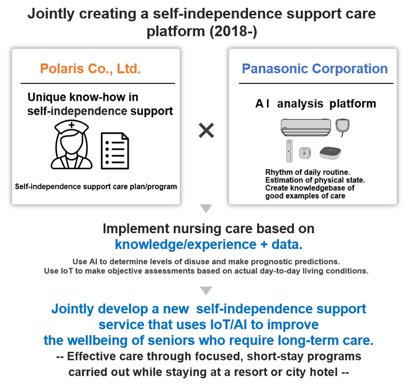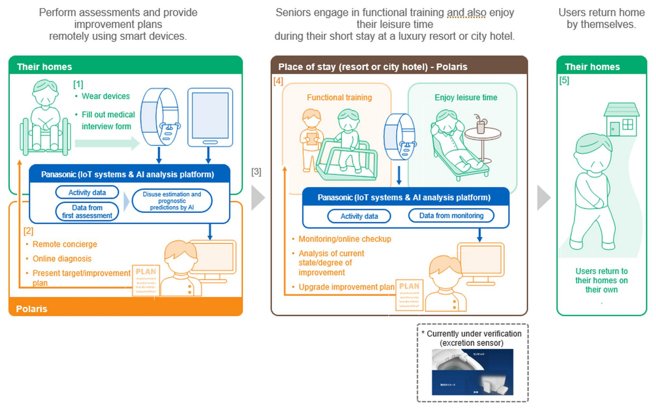
Dec 25, 2025
- Products & Solutions
- Stories
- Technology
- AI & Robotics
- R&D
- Business Solutions
Sep 24, 2021
Products & Solutions / Press Releases
Hyogo/Osaka, Japan - Polaris Co., Ltd., which operates day service long-term care facilities nationwide specializing in self-independence support, and Panasonic Corporation announced a new short-stay self-independence support service using IoT/AI technologies to improve the wellbeing of seniors who require long-term care. The service will launch at the Rihga Royal Hotel (Osaka) on October 1, 2021.
Since its founding, Polaris, headquartered in Takarazuka City, Hyogo Prefecture, has been working to help seniors reduce the level of care assistance provided under the long-term care insurance system in Japan. Over the past seven years, the company’s efforts have led to improvements in the level of care services needed for 2,606 individuals, with 516 individuals now being able to live self-independent lives without relying on the long-term care insurance system at all. By combining Polaris's track record and know-how in providing self-independence support, and the IoT/AI technologies Panasonic has cultivated through its “LIFELENS” long-term care operational support service for nursing-care facilities, the two companies will implement a new service for effectively improving the wellbeing of seniors who require long-term care consisting of a focused, short-stay program to be carried out while staying at a resort or city hotel.

Polaris and Panasonic have been jointly developing and demonstrating their self-independence support care platform since February 2018. For this new service, the companies jointly developed a remote assessment system that utilizes wearable and mobile devices to evaluate the conditions of seniors in a remote setting without the need to meet them face-to-face. The system can gather quantitative data on their conditions quickly and remotely, making it possible to deliver a uniform high level of self-independence support care.
Demonstrations of this system, conducted at Polaris's day service locations, have confirmed that assessments and prognostic predictions for formulating rehabilitation plans can be carried out remotely without direct face-to-face contact. Based on the results from these demonstrations, the companies will be launching a new short-stay self-independence support service based on this system at the Rihga Royal Hotel (Osaka).
In this service, users stay in a resort or city hotel for a short period of time in a relaxed atmosphere to perform their rehabilitation exercises according to health management regimens and care plans individually optimized for each user. This can also help improve disuse syndrome* experienced by seniors who may have tended to spend longer hours at home due to the COVID-19 pandemic. The service will lead to improving the wellbeing of seniors and, therefore, reducing social security costs.
The user wears a wearable device - which is included in the remote assessment kit users receive in advance - at home for about one to two weeks, and then fills out an online medical interview form using a tablet device.
Based on information gathered by the wearable device, information entered by the user, and details from online interviews, expert staff diagnose the user’s state of health and disuse syndrome, etc., estimate the prognosis, and develop an improvement plan.
The user confirms the proposed improvement plan, and services begin at where he or she stays.
Experienced Polaris nursing care staff provide highly specialized care while observing each person's condition. Because quantitative monitoring can be performed via wearable devices, etc. even after the program starts, care can be provided more effectively than ever before. Users are also given advice on day-to-day life in general, such as on how to spend their leisure time as well as about meals and hydration.
The aim is to enable individuals to live self-independent lives after a three-month stay.
 Flow of this service
Flow of this service
Going forward, the companies will be rolling this service out to various hotels and resorts in Japan and overseas. In addition, they will provide extensive concierge services after the seniors go back home from their short stay and build a system that allows them to perform rehabilitation regimens at home that will help them maintain their self-independence. The companies will also make further upgrades in converting Polaris' self-independence support know-how to AI and aim to spread these services to general seniors.
*Disuse syndrome: Deterioration of mental and physical function due to continuation of excessive rest
- Business Development Office, Technology Division, Panasonic Corporation
e-mail: sac_info@gg.jp.panasonic.com
- Public Relations Office, Polaris Co., Ltd.
e-mail: kouhou@polaris.care
Polaris is currently providing self-independence support type day care service at about 70 sites all over Japan. Since its founding in 2002, Polaris has been working to help seniors reduce the level of care assistance provided under the long-term care insurance system in Japan. Over the past seven years, the company’s efforts have led to improvements in the level of care services needed for 2,606 individuals, with 516 individuals now being able to live self-independent lives without relying on the long-term care insurance system at all. With the concept of "Being able to live at home forever", Polaris is attempting to help all the seniors in the world have better health and achieve independent life forever.
Panasonic Corporation is a global leader developing innovative technologies and solutions for wide-ranging applications in the consumer electronics, housing, automotive, and B2B sectors. The company, which celebrated its 100th anniversary in 2018, operates 522 subsidiaries and 69 associated companies worldwide and reported consolidated net sales of 6,698.8 billion yen for the year ended March 31, 2021. Committed to pursuing new value through collaborative innovation, the company uses its technologies to create a better life and a better world for customers. Learn more about Panasonic: https://www.panasonic.com/global.
The content in this website is accurate at the time of publication but may be subject to change without notice.
Please note therefore that these documents may not always contain the most up-to-date information.
Please note that German, Spanish and Chinese versions are machine translations, so the quality and accuracy may vary.